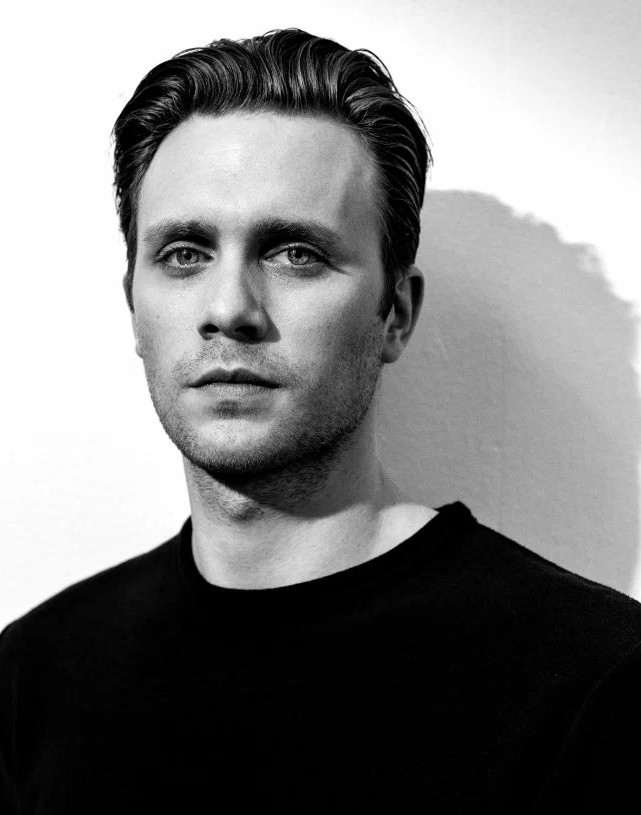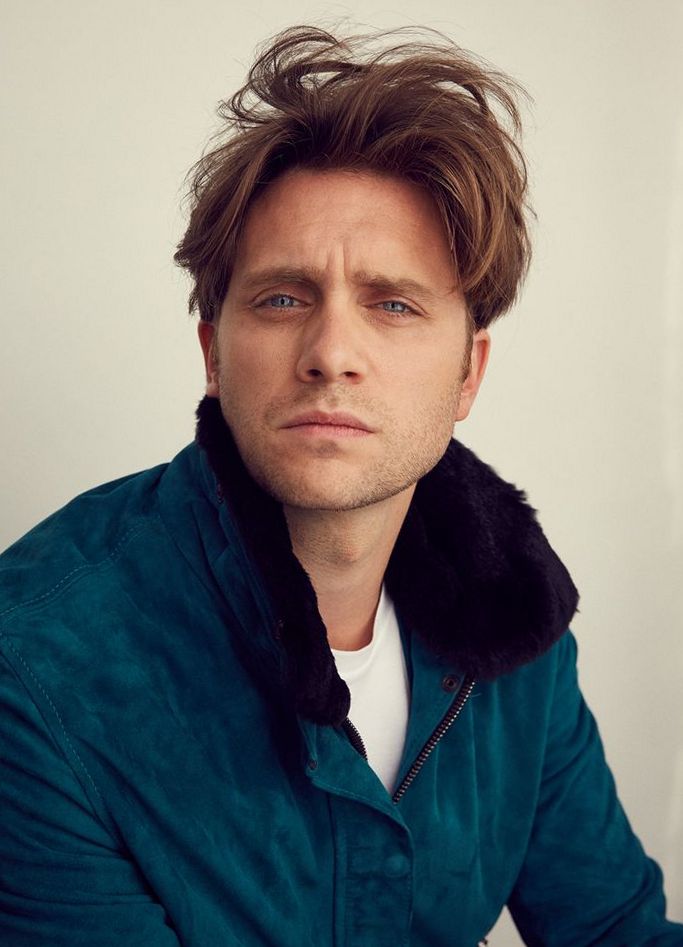Martin Wallstrom
Masterclass in Menace: Deconstructing The Unforgettable Star of ‘Mr. Robot’
There are some performances that don’t just define a show; they haunt it. They become a magnetic pole around which the entire narrative orbits, even when they’re off-screen. With two simple words, “Bonsoir, Elliot,” Swedish actor Martin Wallström did just that, turning the impeccably dressed, ruthlessly ambitious Tyrell Wellick into one of the most mesmerizing and enigmatic figures in modern television. In USA Network’s cyber-thriller Mr. Robot, Wallström crafted a character who was more than a villain; he was a walking paradox, a symphony of controlled chaos whose polished Scandinavian exterior barely contained a storm of ambition, vulnerability, and terrifying need.
But to label Wallström merely as Tyrell Wellick is to miss the point entirely. His career, spanning over two decades, is a fascinating study in duality—between the understated naturalism of Swedish cinema and the heightened drama of American television, between the quiet protector and the obsessive predator. Wallström is an actor who has built a career deconstructing a very specific type of modern masculinity, one defined by a pristine surface that conceals a universe of internal turmoil. This is not just the story of the man who played Tyrell Wellick; it’s an exploration of an artist whose talent was forged in one cinematic tradition and perfectly deployed in another, creating a legacy of unforgettable, unsettling, and deeply human characters.
Forging a Chameleon: The Swedish Foundation
Long before he became the face of E Corp’s sinister corporate ladder, Martin Wallström was a seasoned actor in his native Sweden. Born in Uddevalla, he began his professional career at the age of 15 in the 1998 film Hela Härligheten (Love Fools). This early start was not a fluke but the beginning of a dedicated pursuit of the craft. He formalized his training at the prestigious Academy of Music and Drama at the University of Gothenburg, graduating in 2008. This classical foundation provided him with a technical skill set that would become invaluable, but it was his work in the Swedish film and television industry that truly shaped his artistic sensibilities.
His early filmography is a map of the Swedish cinematic landscape, with roles in numerous TV series and films, including a recurring part in the popular Johan Falk crime franchise. This period was crucial in developing a style rooted in a different storytelling tradition. As Wallström himself has noted, Swedish cinema often favors a more “down to Earth” approach, contrasting with the “heightened drama” that is more common in American productions. This grounding in realism, where emotion is often conveyed through subtext and restraint, became a cornerstone of his acting style.
It is this very foundation that made him such a compelling choice for his American debut. His success was not a simple case of a foreign actor being “discovered.” Instead, it was a targeted acquisition of a specific talent.

The rise of prestige television in the 2010s created a demand for actors who could handle complex, internalised performances, and Wallström, with nearly two decades of experience in the nuanced world of Scandinavian drama, was perfectly positioned. His Swedish training wasn’t an obstacle to be overcome for American audiences; it was the essential ingredient that made his portrayal of a character like Tyrell Wellick so uniquely unsettling.
The International Launchpad: Simple Simon (2010)
Before he was synonymous with corporate menace, Martin Wallström delivered a performance of profound warmth and patience that would serve as his introduction to the international stage. In Andreas Öhman’s 2010 dramedy Simple Simon (I rymden finns inga känslor), Wallström plays Sam, the older brother and caretaker of Simon (Bill Skarsgård), a young man with Asperger’s syndrome who requires a life of absolute, unchanging routine.
The film’s plot is set in motion when Sam’s girlfriend, Frida, unable to cope with Simon’s rigid demands, breaks up with him. Devastated by the disruption to his schedule and seeing his brother’s subsequent depression, Simon embarks on a scientifically-minded, logical quest to find Sam a new, perfect partner by asking a list of 13 carefully selected questions to random women. The film is a charming, funny, and deeply moving exploration of family, love, and the challenge of connecting with those who see the world differently.
Wallström’s role as Sam is the film’s emotional core. He is the anchor in Simon’s chaotic world, a figure of “endlessly loving and patient” support. His performance is a masterclass in subtlety. He has to convey the immense frustration and heartbreak of his own life falling apart while never losing the deep-seated affection he has for his brother. It’s a performance built on quiet glances and weary sighs, a direct counterpoint to the explosive intensity he would later become famous for. As one viewer astutely noted after seeing him in
Mr. Robot, when looking back at his role in Simple Simon, “You just can’t believe it’s the same guy”.
The film was a critical success, earning four nominations at the Guldbagge Awards (the Swedish equivalent of the Oscars) and, most significantly, was selected as Sweden’s official entry for the 83rd Academy Awards, making the shortlist for Best Foreign Language Film. This international recognition was instrumental in placing Wallström on the radar of casting directors worldwide. More than just a breakout film,
Simple Simon serves as a “Rosetta Stone” for understanding the full breadth of Wallström’s talent. Both Sam and his later character, Tyrell Wellick, are defined by their intense relationships with a brilliant, neurodivergent, and socially isolated protagonist. But they stand on opposite moral poles. Sam is the selfless protector, whose life is dedicated to creating a stable environment for his brother. Tyrell is the selfish predator, who seeks to harness his target’s brilliance for his own obsessive ends. By playing both the protector and the predator in such similar dynamics, Wallström demonstrated a profound understanding of codependency and a range that was nothing short of remarkable.
The Role of a Lifetime: Unpacking Tyrell Wellick in Mr. Robot (2015-2019)

Few characters in recent television history have been as electrifyingly unpredictable as Tyrell Wellick. As the ambitious Senior Vice President of Technology at the nefarious E Corp, Tyrell is introduced as a slick, Patrick Bateman-esque figure, a man whose ambition is a ravenous, all-consuming force. Yet, over four seasons of Mr. Robot, Wallström peeled back the layers of that designer suit to reveal a man who was profoundly broken, insecure, and desperate for a connection he could neither understand nor control.
Wallström’s performance is a masterclass in portraying controlled chaos. On the surface, Tyrell is the epitome of corporate polish, but beneath it, there is a constant, simmering rage. We see it in his interactions with his equally manipulative wife, Joanna, where it becomes clear that his climb up the corporate ladder is fueled as much by her machinations as his own drive. We see it in his sudden, terrifying outbursts, like when he pays a homeless man to let him vent his frustrations in a brutal beating, or in the shocking murder of Sharon Knowles. These moments reveal a man whose carefully constructed facade is perpetually on the brink of shattering. Fan and critical reception has often centered on this duality; Wallström’s performance was lauded for making Tyrell both a terrifying antagonist and a strangely sympathetic, tragic figure.
The core of the character, and the performance, is Tyrell’s obsessive relationship with the show’s protagonist, Elliot Alderson (Rami Malek). This is not a standard hero-villain dynamic. Tyrell is not simply trying to defeat Elliot; he is trying to possess him, to understand him, to merge with him. Wallström himself described the dynamic as an intense, “almost physical” tension, stating that Tyrell “wants to consume” Elliot. This reframes the entire narrative. The 5/9 hack is not just a cyber-attack; it is the destructive consummation of their twisted partnership. Wallström masterfully communicates this through subtle physical choices, from the way his Swedish accent becomes more pronounced in moments of vulnerability to the sheer longing in his eyes during their confrontations.
While Mr. Robot collected a trove of awards, including Golden Globes for Best Television Series and acting wins for Christian Slater, Wallström’s contribution as a key part of the lauded ensemble was undeniable. He took what could have been a one-dimensional corporate villain and transformed him into a haunting exploration of loneliness and obsession. He subverted the trope by playing Tyrell not as a man who wanted to beat the hero, but as one who desperately, tragically, wanted to be loved by him.
Life After the society Hack
An actor who achieves global recognition for such an iconic role often faces a predictable career path: a string of Hollywood offers and a move toward mainstream stardom. Martin Wallström, however, has chosen a more deliberate and artistically driven route in the years following Mr. Robot‘s conclusion. His career choices reveal an actor more interested in complex character studies than in leveraging fame for its own sake, balancing compelling international projects with a return to his Swedish roots.
This pattern was evident even during his Mr. Robot tenure with his role in Easy Money III: Life Deluxe (2013), the final installment of the acclaimed Swedish crime trilogy that helped launch Joel Kinnaman’s international career. In the film, Wallström plays Martin Hägerström, an undercover police officer tasked with infiltrating the Serbian mafia. The role required him to portray a man whose sense of duty is tested when he falls for the mob boss’s daughter, a classic undercover trope that Wallström imbues with a quiet intensity. While some critics found the film’s plot convoluted, praising it as a “captivating” thriller while others deemed it an “absolute mess,” his performance as a man caught between two worlds was a compelling showcase of his ability to handle morally gray characters.
Since Mr. Robot ended, Wallström has continued to select projects that allow for deep character exploration. In the 2018 sci-fi thriller Parallel, he once again plays a character, Noel, who succumbs to his darker impulses after discovering a portal to other universes. Wallström acknowledged the surface-level similarities to Tyrell Wellick but was drawn to Noel’s different starting point as an “average guy” whose transformation is more sudden, like opening Pandora’s Box. More recently, he has returned to Scandinavian-centric stories, starring in the Lithuanian-American historical drama

Ashes in the Snow (2018), the Swedish television series Headhunters (2022), an adaptation of the popular Jo Nesbø novel, and the 2024 thriller Stolen, which focuses on the indigenous Sámi community in Sweden. This deliberate choice to work on high-profile Swedish and European projects, such as the long-running crime series
Beck, demonstrates a commitment to his craft over pure commercialism, leveraging his international profile to participate in stories that resonate with him personally.
The Wallström Method: An Actor on His Craft
Dissecting Martin Wallström’s performances reveals a craftsman’s approach to acting, one built on a foundation of intellectual rigor and emotional instinct. In various interviews, he has shed light on a process that is both collaborative and deeply personal, driven by a respect for the script and a desire to find the human truth within even the most extreme characters.
For Wallström, everything begins with the writing. He has stated unequivocally that “it’s impossible to make a good TV show or a good film if it’s not a good script”. This belief in the power of the source material informs his collaborative process with directors. He is not a passive instrument but an active participant, known for bringing “1000 ideas” to the table and enjoying the “friction” of creative debate to find the best approach for a scene. This intellectual engagement is paired with deep research. To get into the headspace of his character Noel in
Parallel, who deals with alternate versions of himself, Wallström researched the psychology of adoption to understand the feeling of knowing “somewhere else in this world, there is someone who is almost exactly like me”.
However, this preparation serves as a launchpad for instinctual, in-the-moment discovery. When discussing the challenge of portraying Tyrell Wellick, he speaks of the difficulty of making the character’s extreme actions believable and the joy of playing someone “without limits”. This suggests a method where a logical framework allows for emotional freedom. He builds the character’s psychology through research and script analysis, but within that structure, he relies on his instincts to bring the character’s turmoil to life authentically, a challenge made greater by the non-sequential nature of film production.
The Verdict: An Enduring, Enigmatic Talent
Martin Wallström’s career is a compelling narrative of how specialized talent finds its perfect moment on a global stage. He is far more than the man who gave us Tyrell Wellick; he is an artist who excels at portraying a uniquely modern form of masculinity—one defined by an immaculate, ambitious surface that conceals a fragile, chaotic, and often dangerous inner world. His performances are studies in tension, capturing the precise moment when control begins to fracture and the polished veneer gives way to the abyss beneath.
His strength lies in this duality. He is a character actor with the presence of a leading man, consistently drawn to roles that explore the dark, morally ambiguous corners of the human psyche. He can be the patient, loving brother in Simple Simon or the obsessive, power-hungry executive in Mr. Robot, but in both, he is exploring the same fundamental theme: the desperate and often destructive human need for connection. Whether in a Swedish crime drama or a high-concept American thriller, Martin Wallström remains one of the most intelligent and captivating performers working today. His career is a powerful testament to the idea that the most memorable characters are rarely the simplest, and that true menace is always most terrifying when it is laced with vulnerability.
| Film/Series Title | Year(s) | Role | Director(s) | Rotten Tomatoes (Tomatometer/Audience) | Metacritic (Metascore/User Score) | Notes & Key Awards |
| Simple Simon | 2010 | Sam | Andreas Öhman | N/A | N/A | Shortlisted for Best Foreign Language Film at the 83rd Academy Awards; 4 Guldbagge nominations. |
| Easy Money III: Life Deluxe | 2013 | Martin Hägerström | Jens Jonsson | N/A | 6.2/10 (IMDb) | Final film in the acclaimed Swedish crime trilogy starring Joel Kinnaman. |
| Mr. Robot | 2015-2019 | Tyrell Wellick | Sam Esmail, et al. | 94% (Average) | 81 (Average) | Breakout international role. Show won 2 Golden Globes, 3 Emmys, and a Peabody Award. |
| Ashes in the Snow | 2018 | Nikolai Kretzsky | Marius A. Markevicius | 53% / 78% | 43 / 7.9 | Lithuanian-American historical drama based on the novel Between Shades of Gray. |
| Parallel | 2018 | Noel | Isaac Ezban | 80% / 58% | N/A | Sci-fi thriller exploring ambition and the multiverse. |
| Headhunters | 2022 | Jon Christian Wiklund | Geir Henning Hopland, et al. | N/A | N/A | TV series adaptation of Jo Nesbø’s best-selling novel. |
| Stolen | 2024 | Robert | Elle Márjá Eira | 86% / 65% | N/A | Swedish thriller focusing on the Sámi community, released on Netflix. |
